Search Images
Browse Content (p. 890)
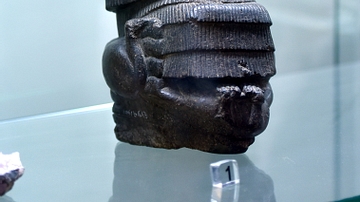
Image
Goddess Bau from Ur
Statue of a seated goddess, Bau (Nintinugga), from the Ningal Complex at the city of Ur, Iraq. Isin-Larsa period, c. 1800 BCE. Bau was the consort of the god Ninurta and the goddess of healing. On display the Iraq Museum in Baghdad, Republic...
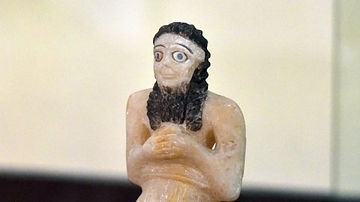
Image
Male Worshiper from Khafajah at the Iraq Museum
Statue of a Sumerian male worshiper from the hoard in Nintu Temple V at Khafajah (ancient Tutub), Mesopotamia, Iraq. Early Dynastic period, 2600-2400 BCE. Excavated by the Oriental Institute of the University of Chicago in the 1930s, 8th...
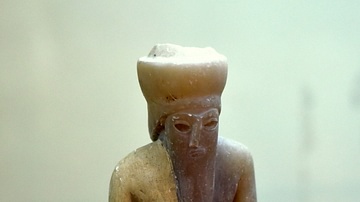
Image
Male Worshiper from Tell Asmar Hoard at the Iraq Museum
This is a votive statuette of a male Sumerian worshiper from the Square Temple of Abu at Tell Asmar (ancient Eshnunna, Mesopotamia, Iraq), Early Dynastic III, 2600-2400 BCE. Excavated by the Oriental Institute of the University of Chicago...
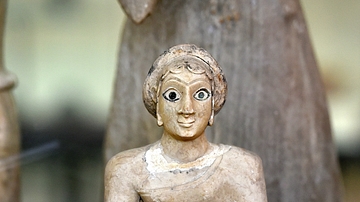
Image
Female Worshiper from Khafajah at the Iraq Museum
Statue of a Sumerian female worshiper from the Temple of Sin at Khafajah (ancient Tutub), Iraq. Early Dynastic period, c. 2600 BCE. Excavated by the Oriental Institute of the University of Chicago in 1930s, 4th season. On display at the Iraq...
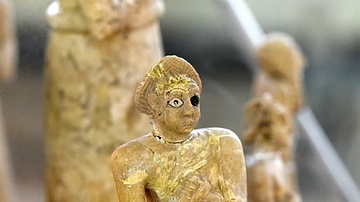
Image
Female Worshiper from Tell Asmar Hoard at the Iraq Museum
This is a votive statuette of a female Sumerian worshiper from the Square Temple of Abu at Tell Asmar (ancient Eshnunna, Mesopotamia, Iraq), Early Dynastic III, 2600-2400 BCE. Excavated by the Oriental Institute of the University of Chicago...
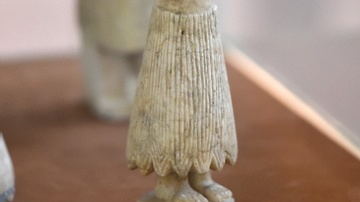
Image
Votive Statue of Male Worshiper, Tell Asmar Hoard
This is a votive statuette of a male Sumerian worshiper from the Square Temple of Abu at Tell Asmar (ancient Eshnunna, Mesopotamia, Iraq), Early Dynastic III, 2600-2400 BCE. Excavated by the Oriental Institute of the University of Chicago...
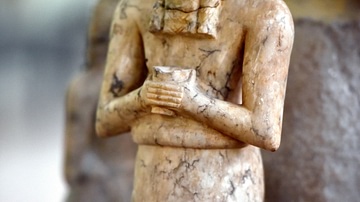
Image
Statuette of Male Worshiper, Tell Asmar Hoard
This is a votive statuette of a male Sumerian worshiper from the Square Temple of Abu at Tell Asmar (ancient Eshnunna, Mesopotamia, Iraq), Early Dynastic III, 2600-2400 BCE. Excavated by the Oriental Institute of the University of Chicago...
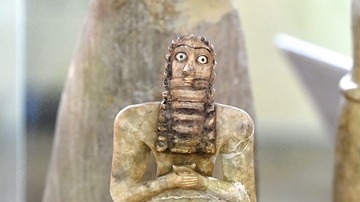
Image
Male Worshiper from Tell Asmar Hoard, Iraq Museum
This is a votive statuette of a male Sumerian worshiper from the Square Temple of Abu at Tell Asmar (ancient Eshnunna, Mesopotamia, Iraq), Early Dynastic III, 2600-2400 BCE. Excavated by the Oriental Institute of the University of Chicago...
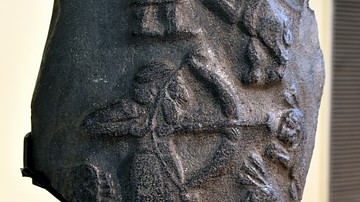
Image
Stele of Lion-Hunt from Uruk
Stele of a lion-hunt from Uruk, the oldest narrative Mesopotamian sculpture (in relief) and the first documented evidence of lion-hunting in Mesopotamia. It depicts two men hunting lions using a spear and arrows. One man is smaller than the...
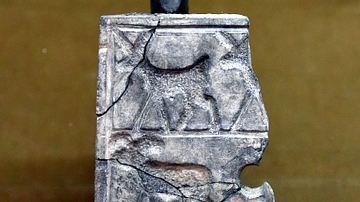
Image
Sumerian Plaque from Khafajah
This bituminous stone plaque was found in fragments. It was excavated by the Oriental Institute of the University of Chicago in the early 1930s; the different fragments were collected during the 1st and 3rd seasons. It depicts processions...